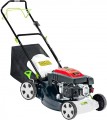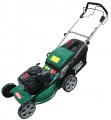Cutting width
The capture width provided by the unit, in other words, the width of the strip of land cultivated in one pass. In fact, this size corresponds to the width of the working nozzle.
The large working width is useful when processing large open spaces, as it allows you to finish the job in a small number of passes. On the other hand, for hard-to-reach places, relatively narrow tools are better suited, able to go where a wider unit will not fit. In addition, the width of the tool directly affects the weight and price.
In general, it makes sense to compare in terms of working width only units of the same type (see above). However, it is worth noting here that trimmers do not differ so much from each other — most models capture from 25 to 45 cm (and a wide processing band is provided by moving the nozzle from side to side). As for the other types, in the most modest models the capture width
does not exceed 40 cm, in the heaviest and most powerful it can be
56 – 60 cm or even
more(in mini tractors — up to 1.5 m).
Min. cutting height
The minimum cutting height provided by the lawnmower — that is, the smallest height of grass that can remain after the passage of the machine. It makes sense to pay attention to this indicator mainly in cases where the lawn is planned to be cut as short as possible. In addition, the lower the minimum height (with the same maximum), the wider the height adjustment range of this model.
Max. cutting height
The maximum cutting height that the lawn mower can achieve is the maximum height of grass that can be left after the machine has passed.
This parameter is relevant mainly for those cases when you want to leave the grass on the lawn relatively long. In addition,
lawn mowers with high cutting heights have a wide range of mowing adjustments.
Bag type
A type of bag used in a lawn mower to collect grass clippings.
—
Hard. Bags (containers) made of a hard material, usually plastic. Such a container is more convenient to unload than a soft one, it is more durable and reliable, but it weighs a little more.
—
Soft. The advantages of soft fabric bags are primarily low weight and the ability to fold after hours, which can facilitate storage. In addition, the degree of fullness of such a bag can be controlled by eye without any special indicators. On the other hand, soft bags are very inconvenient to unload.
—
Combined. Bags that combine soft and hard materials in construction; the upper part is usually made solid. This combination makes it easier to unload the bag and at the same time allows it to be rolled up quite compactly for storage.
— Is absent. The absence of a bag is characteristic of some varieties of mowing units — in particular, mowers and trimmers (see "Type"). In classic lawn mowers, it usually means that this model does not involve collecting grass — all cut vegetation remains on the ground. At the same time, most of these models have the function of mulching (see above), however, there are exceptions.
Bag volume
The volume of the grass clipping bag supplied with the lawn mower. Manufacturers select this volume depending on the power, performance and overall level of the unit, however, similar models may differ in this indicator. In such cases, it is worth considering that a larger bag takes longer to fill and needs to be unloaded less often, but it weighs more and takes up more space (even when empty). Mostly the difference in the volume of the bag is 5 liters and there are
lawn mowers for 35,
40,
45,
50, 55,
60,
65,
70 and more liters.
Full bag indicator
Indicator indicating the degree of filling of the bag. The design and capabilities of such an indicator can be different: for example, in some models it only gives an overflow signal, in others it allows you to determine the amount of grass in the bag at any time. However, anyway, this function provides additional convenience: it allows you to evaluate the fullness without removing the bag and without interrupting work.
Speed adjustment
The ability
to change the speed of the self-propelled unit (see "Features"). In the absence of this function, you need to pay special attention to the maximum speed, since "non-adjustable" lawnmowers have, in fact, two modes — parking and full speed. But if there is an adjustment, you can adjust the speed of movement to the specifics of the situation. For example, slow motion will be the best mode for dense, long-term uncut grass (or if the operator for some reason cannot follow the mower quickly); and high speed will allow you to quickly cope with a large volume of relatively simple work.
Motor model
Model of the engine installed in the lawn mower. The main performance data of the engine is usually indicated in the general data for the unit. However, knowing the exact name of the motor, you can find more detailed information on it — from specific data to reviews and reviews. Also, data on the engine model can be useful when searching for spare parts or consumables.
Motor power
Lawnmower engine power expressed in horsepower. The common unit of power these days is the watt, but gasoline and diesel engines (see "Engine Type") are traditionally referred to as hp. Some units are easy to convert to others: 1 hp. approximately equal to 735 watts.
In general, the more powerful the engine, the more performant the mower is and the better it handles with heavy work such as cutting thick grass, bushes, etc. On the other hand, high power has a corresponding effect on fuel consumption, as well as the weight and price of the engine. In addition, it should be taken into account that different types of mowers (see "Type") differ in terms of power requirements. For example, among trimmers there are many models with a capacity of
0.7 – 1.3 hp., for gasoline lawn mowers, the minimum power is already in the range of
1.3 – 2 hp., and for
mowers,
at least 2.5 hp is required. . So you can only compare units of the same type in terms of power. Detailed recommendations for choosing a mower depending on its type and features of the planned work can be found in special sources.

